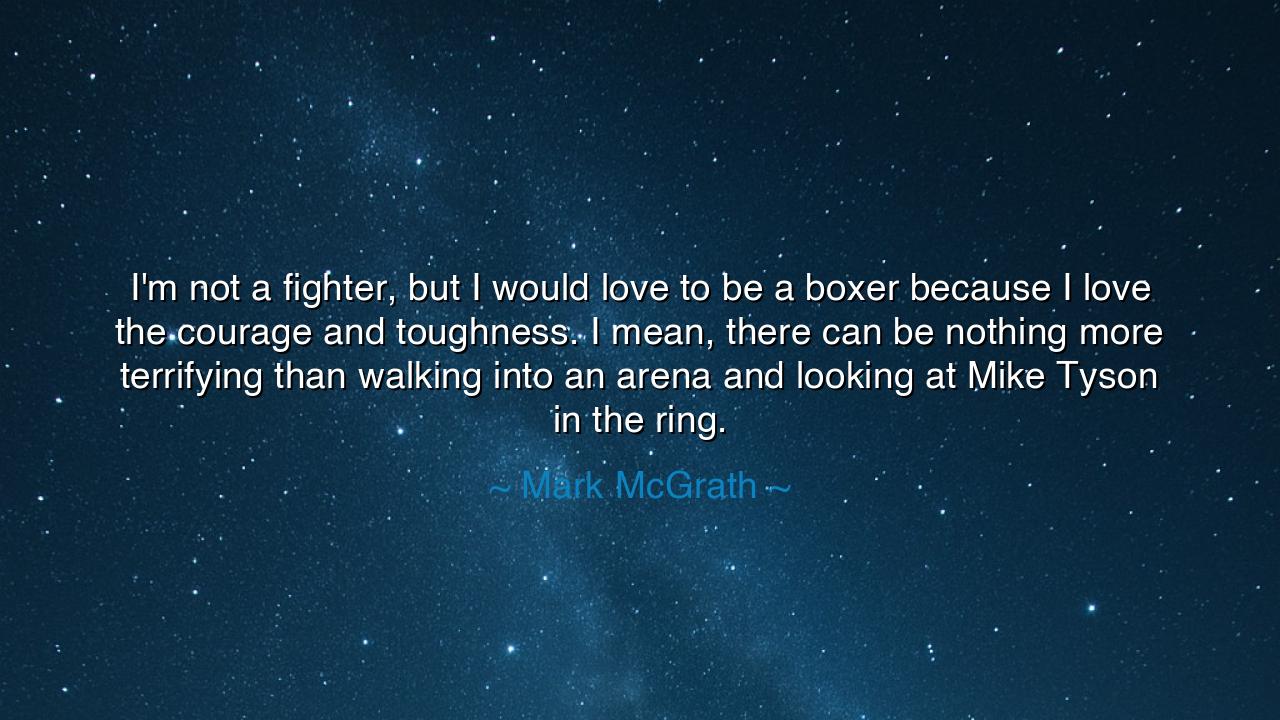
I'm not a fighter, but I would love to be a boxer because I love
I'm not a fighter, but I would love to be a boxer because I love the courage and toughness. I mean, there can be nothing more terrifying than walking into an arena and looking at Mike Tyson in the ring.






“I’m not a fighter, but I would love to be a boxer because I love the courage and toughness. I mean, there can be nothing more terrifying than walking into an arena and looking at Mike Tyson in the ring.” Thus spoke Mark McGrath, a man not of the ring but of reflection, who looked upon the warrior’s path with reverence. In his words, one feels both admiration and awe — the acknowledgment of courage, the yearning for toughness, and the profound respect for those who face fear not with flight, but with fortitude. For though McGrath was no boxer, he understood that the ring is a mirror of life itself — a sacred space where fear and faith, pain and purpose, collide.
To walk into a boxing arena, as McGrath imagines, is to confront the raw essence of human existence. The boxer stands alone, stripped of all pretense, with only his training, his will, and his heart to defend him. Before him looms his opponent — in this case, the legendary Mike Tyson, whose name alone summoned dread in even the bravest of men. Tyson, a symbol of power and ferocity, embodied the primal fear every fighter must conquer: the fear of defeat, of pain, of being broken before the watching world. Yet McGrath sees in that confrontation not merely violence, but a higher truth — that courage is not the absence of fear, but the act of walking toward it.
This truth has echoed through the ages. The ancient Greeks revered the boxer as a hero of endurance, a man who faced not only his rival but also his own limits. In the Olympic games of old, these warriors fought not for gold or fame, but for the glory of testing themselves. Likewise, the samurai of Japan believed that to meet death without trembling was the ultimate victory — the conquest of the self. McGrath’s admiration arises from this same source: he is not drawn to the fight itself, but to the inner battle it represents — the daily struggle each of us faces when fear stands before us and demands surrender.
For in truth, every human life has its own arena, and every soul its own Tyson to face. It may not be a man of muscle and might, but rather a challenge unseen — the terror of failure, the weight of loss, the silence of doubt. We may not all wear gloves or step beneath bright lights, but we each feel the pounding of the heart when destiny calls us forward. And like the boxer, we must decide: to retreat into comfort or to rise into courage. McGrath’s longing to “be a boxer” is thus not a desire for combat, but a yearning for that purity of will — the unflinching resolve to stand one’s ground in the face of fear.
Consider the story of Muhammad Ali, another legend of the ring, who faced not only physical opponents but the wrath of an entire nation when he refused to fight in a war he did not believe in. He was stripped of his title, condemned by many, yet he stood firm in his convictions. “I have nothing to lose by standing up for my beliefs,” he said. His fight became larger than sport — it became a testament to moral toughness, to the spirit’s refusal to yield even when the body is threatened. Ali, like Tyson, became an emblem of that sacred combination McGrath so admires: courage that endures pain, and toughness that transcends it.
In McGrath’s reflection, we hear a truth for all ages: that courage is not confined to warriors or athletes, but belongs to all who confront fear with open eyes. The mother who faces each day’s burdens without complaint, the artist who bares his soul to the world, the student who dares to dream beyond his station — these are also boxers in the great arena of life. To admire the fighter, then, is to honor the fighter’s spirit within ourselves — that sacred flame which says, “I may tremble, but I will not flee.”
Let this, then, be the lesson: do not seek a life without fear, but one filled with courage. Do not wish for ease, but for toughness to endure hardship. When the time comes to face your own Tyson — whatever form he takes — remember the wisdom hidden in McGrath’s words. Step into the arena. Feel your fear, but do not bow to it. For courage is not the roar of confidence, but the quiet heartbeat that says, “I will stand.”
Thus, the quote of Mark McGrath becomes not a mere homage to boxing, but a hymn to the human spirit. He reminds us that greatness is not in the blow we strike, but in the heart that dares to step forward. For in the end, all of life is a fight — not against others, but against the weakness within. And when you face that battle with courage and truth, you too will know the strength that dwells in every true boxer’s soul.






AAdministratorAdministrator
Welcome, honored guests. Please leave a comment, we will respond soon